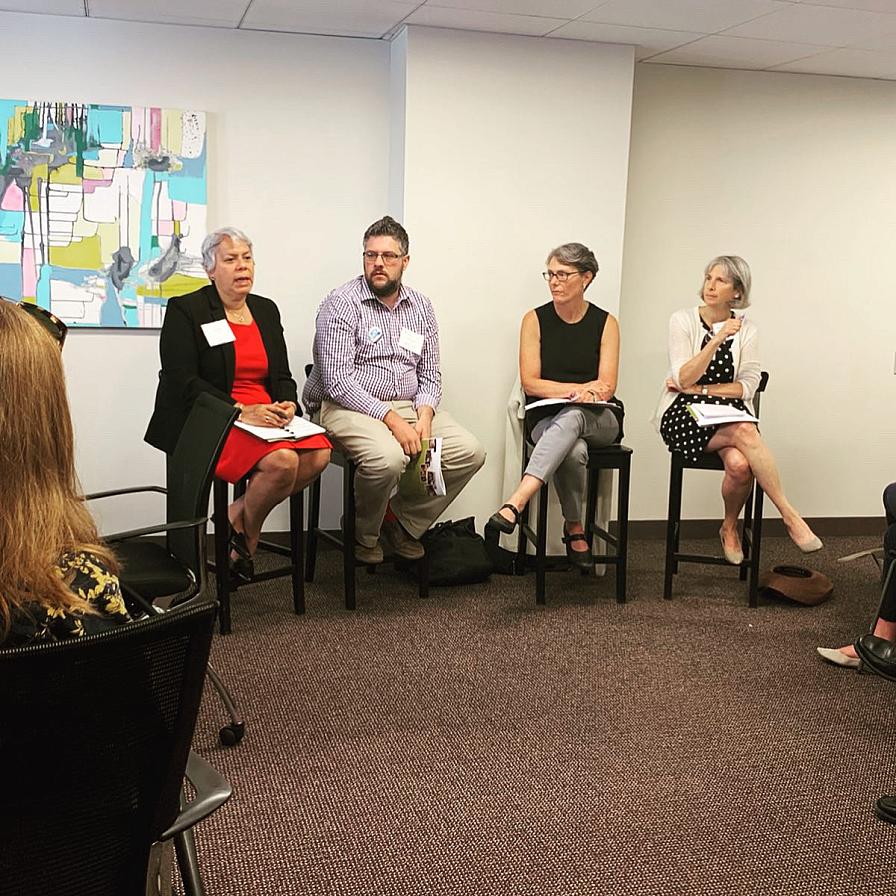
Panelists (from left to right): Veronica Serrato, ED of Project Citizenship; Brian Pastori, Deputy Director of CEDC; Julia Gittleman, Principal at Mendelsohn, Gittleman & Associates, LLC; and Susan Musinsky, ED of Social Innovation Forum
Welcome Wyona Lynch-McWhite, SIF's New Executive Director!

Panelists (from left to right): Veronica Serrato, ED of Project Citizenship; Brian Pastori, Deputy Director of CEDC; Julia Gittleman, Principal at Mendelsohn, Gittleman & Associates, LLC; and Susan Musinsky, ED of Social Innovation Forum
Developing performance measurement strategies and implementing program evaluation is a challenging task for small nonprofit organizations. It requires a commitment of time, focus, and money that can almost feel impossible, combined with taxing day-to-day operations. A core part of our work at SIF is to help small, local nonprofit organizations strategize and implement metrics that demonstrate the effectiveness of their work.
On July 24, we had an opportunity to hear and learn about the impact of that performance measurement work from some of our 2017 Social Innovators. Our team brought together a panel composed of Julia Gittleman, Principal at Mendelsohn, Gittleman and Associates, 2017 Social Innovators Veronica Serrato, Executive Director of Project Citizenship, and Brian Pastori, Deputy Director at Community Economic Development Center (CEDC) in New Bedford. In front of a packed room of funders interested in the success of our Social Innovators, the panelists reflected on the opportunities as well as challenges of program evaluation.
Julia began this session by sharing with us a core precept of measurement work: “Measure what you value, and others will value what you measure.” She recommended that organizations large and small think deeply about they want to accomplish and to focus on evaluating their success towards that goal. Julia shared some key practices for simplifying performance measurement reporting.
Julia also shared with funders that NPO’s need upfront funding to be able to invest in data software. She also encouraged funders to recognize the value in descriptive data.
She had some thoughts for the nonprofits and encouraged them to avoid surprises and engage with funders as early as possible to share the data that might explain shifts and challenges meeting goals.
Brian Pastori, Deputy Director of Community Economic Development Center (CEDC)
Prior to joining the Social Innovation Forum, CEDC was working without a data tracking system, which made it particularly challenging to devise a performance measurement strategy. Given SIF’s support, they committed to implementing a database system and learned that 92 percent of their clients were immigrants. With this knowledge, the organization’s priorities changed to meet the needs of their new clientele. After collecting and evaluating data, their work moved from triage to case management enabling them to meet the long-term needs of clients. Over time, they learned to use data as a planning tool and resource to grow stronger relationships.
Veronica Serrato, Executive Director of Project Citizenship
Veronica reflected on the tracking output data that showed the number of new citizens naturalized and the percentage of successful cases. The data revealed a 95% success rate, but that number was becoming harder to maintain with the legislative orders from the Trump administration. For the organization, it was essential to communicate this “story behind the data” so that their team, clients, and funders would have a clear understanding of the organization’s success. Project Citizenship took advantage of SIF's in-kind partnership with the Analysis Group and added tremendous detail and depth to their performance measurement strategy. They began measuring every little win; sending citizenship application in, making a fingerprint appointment, etc. They also built a case for the value of their work by tracking the increased income that new citizens realized once naturalized. They learned that clients who obtained citizenship increased their take-home pay by $965 per family annually.
Our cohort of 2017 Social Innovators also includes Boston CASA, the Institute for Nonprofit Practice, Citizens for Juvenile Justice (CFJJ), Julie’s Family Learning Program, and Room to Grow. As you will see in the Social Innovator Progress Report book, a focus on measuring performance led to more significant impact and learning for each of them. Anne Silver, the interim ED at Boston CASA, shared that often at CASA in child welfare work the outcomes are not in their control, but their revenue grew by 31% from 2017 to 2018, and the number of young people served increased by 33%. The Institute for Nonprofit Practice (INP) focused on growing their staff from 5 to 13 to prepare to launch INP in New York. Citizens for Juvenile Justice (CJFF) passed sweeping juvenile justice reforms. Julie’s Family Learning incorporated a new metric/tracking system with SIF’s In-kind Partner the Analysis Group, and Room to Grow launched a Parent Partner Fellowship allowing for 100 additional families to receive services.
As we have demonstrated, strengthening the social sector depends on honest, intentional relationships between funders and nonprofits. This also holds true as we continue to learn about the challenges inherent in measuring performance. Open communication and a trusting relationship allow funders and nonprofits to communicate about their successes and challenges, leading to continued support and learning on both sides. Our 2017 Social Innovators have been working hard to communicate their progress, learn from their successes and failures, and pivot when it best serves their clients. Please look at the Social Innovator Progress Report book to learn more. We are proud of their work, outcomes, and their commitment to keeping the processes going forward. Susan reminded our 2017 Social Innovators that we would continue to support their work as a part of the SIF “alumni portfolio.” We are committed to supporting funders and nonprofits in building sustainable partnerships that strengthen the social sector, including continued learning about evaluation and measurement, and the challenges inherent in attending to, designing and implementing those strategies.